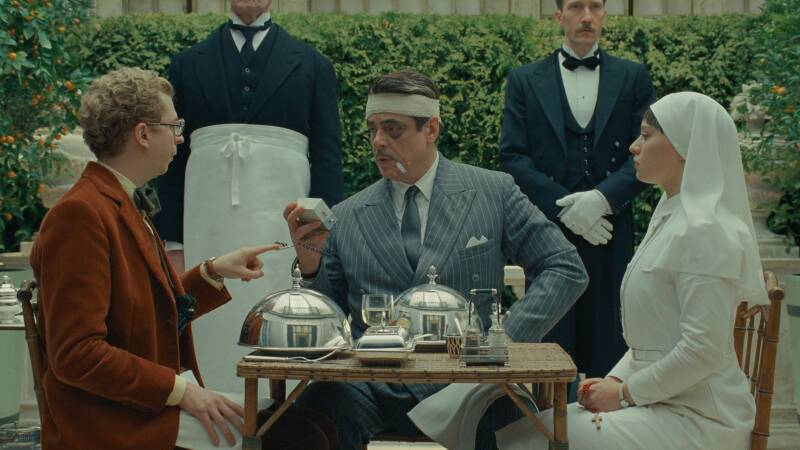
It’s sometimes hard to tell whether Wes Anderson gets more joy from assembling his ensemble casts or meticulously crafting his miniature dreamscapes. But in "The Phoenician Scheme," it’s not just visible — it’s palpable. Every frame hums with intention, with beauty, with a kind of quiet, obsessive passion. This is a deceptively delicate film: a confection dusted in desert sand, perfectly symmetrical and somehow still askew — like a compass caught in an identity crisis. It’s a tale of legacy and deception, of daughters and their shadowy fathers, of monopolies disguised as miracles… and.... bugs. But beneath all the Andersonisms — the ornate props, the ornate prose, the ornate everything — lies something I didn’t quite expect: a bruised and bewildered heart, beating just as loud as his recent works.
The plot, at first glance, is a shimmering farce: a tycoon, Zsa-Zsa Korda (Benicio del Toro, exuding dry menace and melancholy), emerges from a comically rapid sequence of near-death plane crashes to name his convent-raised daughter Liesl (Mia Threapleton) as the unexpected heir to a vast and ethically dubious fortune. What follows is a pastel-shaded odyssey through a fictionalised, vaguely Levantine nation, where Korda and Liesl navigate economic takeovers, family betrayals, and a succession of gloriously unhelpful advisors. There's the usual parade of eccentrics — played by Tom Hanks, Jeffrey Wright, Bryan Cranston, Scarlett Johansson, Rupert Friend, and more — but this time, Anderson uses the ensemble not just to decorate the frame, but to crowd the conscience of his central duo.
And then there's Michael Cera. Finally — finally — in a Wes Anderson film, and my only question is: what took so bloody long? Since Youth in Revolt, I’ve felt Cera was born for this world — his particular brand of hesitant warmth, his ability to seem out of place and perfectly suited all at once. And as Bjørn Lund, a Norwegian entomologist with a spy’s nervous instincts and a poet’s soul, he steals the entire show. Cera plays Bjørn like a boy who fell into the wrong film but decided to stay anyway. His lines feel simultaneously improvised and hand-calligraphed, and his every movement — from the gentle cradling of a beetle to a barely coherent declaration of love — pulses with a kind of bug-eyed honesty that lingers long after the closing credits.
His dynamic with Liesl forms the film’s emotional core. There’s a courtship here, of sorts — not just romantic, but intellectual and spiritual. They talk about insects, death, empires, and forgiveness with the rhythm of people discovering they’re not alone in the world. It’s a relationship that could easily have drifted into caricature, but thanks to Cera’s restraint and Threapleton’s quietly exacting performance, it becomes something else entirely: strange and sweet and softly aching.
Visually, "The Phoenician Scheme" unfolds like a worn fresco — ornate, detailed, but tinged with the weight of erosion. Anderson dials back the vibrant saturation of The French Dispatch or The Grand Budapest Hotel, opting instead for sun-faded yellows, and burnt ochres, where the colours feel as washed-out as the money that built the foundation of Zsa-Zsa Korda's dodgy empire. But I guess, by now, we all know what to expect from Anderson aesthetics. Nothing short of an all you can eat buffet at a confectionary for the eyes.
Where The Grand Budapest Hotel was giddy and operatic, The Phoenician Scheme is watchful and quietly broken. There’s satire here — of capital, of colonialism, of absurdity itself — but there’s also a kind of mourning. Korda’s fortune is built on something deeply rotten, and the film never lets you forget it. Even the laughter has a faint crack in it.
Still, the film isn’t a dirge. It’s buoyed by moments of absurd beauty — a parachute made of embroidered napkins, a sandstorm ballet, a marriage proposal involving live beetles — and scored to a lullaby of softly strummed strings and haunted woodwinds. It's funny, in the way that life is funny when you're trying to read a will while being chased by a camel.
"The Phoenician Scheme" isn’t perfect. It meanders. Some characters blur into each other. A few segments feel like exquisite tangents more than narrative momentum. But it’s one of those rare films that doesn’t fade after viewing, and for all those people that complain about it being too Anderson-esque! Sorry what? Why did you watch it? We are, hmm, 13 films into his filmography. I think the man has chosen his style and what's not to love about that. It percolates. And the more I think about it, the more I suspect it’s one of Anderson’s richest, saddest, and most gently radical works.
With Anderson's latest work, he seems less concerned with resolution than with rhythm — the rhythm of power shifting hands, of family mythologies being rewritten, of people learning how to speak honestly in a world that rewards performance. There’s melancholy tucked beneath the lacquered surface, but also wit, warmth, and an unexpected gentleness. It’s a film about what we inherit and what we discard, about learning to make peace with imperfect blueprints. And in its final frames, as the dust begins to settle, it leaves you with something strangely rare: not closure, but calm.
8/10
Add comment
Comments